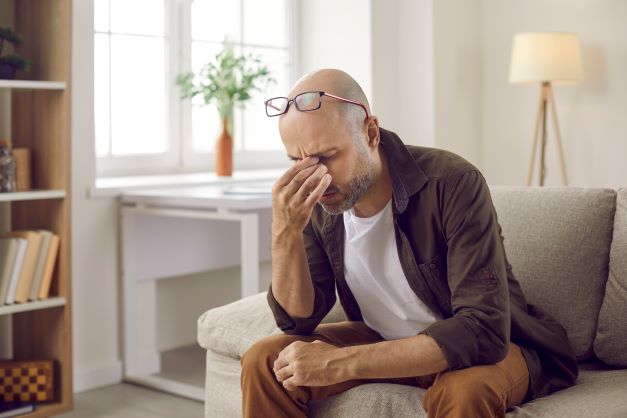A migraine is usually a one-sided, throbbing headache that feels like a vice around your temples. It’s often accompanied by nausea and sensitivity to light and sound. Migraines are no joke – they can be debilitating.
Migraines cannot presently be cured, but several therapies can help reduce the symptoms. It may take time to identify the most suitable therapy for you. You may require time to try out different formulations or mixtures of medications before you locate the ones that are most efficient. Your GP might prescribe a more potent medication if you are unable to manage your migraines with over-the-counter medicines.
But there are ways to prevent them and ease their symptoms if you catch it early enough. Here are some tips on how you can prevent and treat migraines better:
Painkillers:
Migraines can be alleviated with over-the-counter painkillers such as paracetamol, aspirin, and ibuprofen. People who suffer from migraines often find that these medicines are most effective when taken at the very onset of an attack, as they have time to be absorbed into the bloodstream and ease symptoms.
It’s a poor idea to postpone taking pain medication until the headache worsens, as by that time the medication may be ineffective. Soluble painkillers, which are absorbed quickly by the body, are a good choice if you don’t have time to swallow pills. If you’re nauseous or vomiting, you may prefer to take suppositories rather than oral medication. These are inserted into the anus.
It is crucial to adhere to the dosage guidelines when taking over-the-counter painkillers. Make sure to read the packaging for instructions before taking aspirin. Those with a history of stomach ulcers, liver problems, or kidney problems should avoid ibuprofen and aspirin.
Migraines can be exacerbated by frequent use of painkillers, particularly non-prescription painkillers. Doctors refer to this as medication overuse headache or painkiller headache. If you require painkillers repeatedly or if over-the-counter painkillers are ineffective, seek advice from your physician. They may prescribe stronger drugs or recommend combining them with triptans.
If you’re looking for medication to treat migraines for yourself or family members then you’ll find what you need on Med For Less. Med for Less is an online pharmacy that specialises in delivering medication to your door. With their team of experienced pharmacists and physicians, they provide genuine medicines which are delivered in as little as 24 hours.

Triptans
If your migraine symptoms are not being alleviated by regular painkillers, you should see a doctor. They may recommend taking triptan medication in addition to another sort of medication called an anti-nausea drug. Triptans are migraine painkillers that are thought to counteract the neurological alterations that cause migraines.
Migraines are thought to be caused by an abnormal widening of the blood vessels around the brain. Triptans contract the blood vessels around the brain to reverse this process. Triptans are available as tablets, injections, and nasal sprays.
The common triptan side effects include:
- Heaviness in the face, chest and limbs
- Flushing
- Tingling
- Tightness
- Warm sensations
Some patients experience nausea, dry mouth, and drowsiness as part of the Triptan side effects. These effects are usually minor and disappear over time. Triptans may also cause overuse headache if they are overused. Your doctor will typically ask you to come back for a follow-up appointment after you have finished your first course of Triptans. You will be able to talk about their effectiveness and any side affects you experienced.
Anti-sickness medicines
Despite the fact that anti-emetics are used to treat migraine, they are frequently used as anti-sickness medications. A doctor may prescribe them to persons who suffer from migraine without experiencing nausea or vomiting. They may be taken with painkillers and triptans as well as painkillers. Taking them as soon as your migraine symptoms begin will make them more effective.
Anti-emetics are usually available as a tablet or suppository, but they can also be administered as an injection. Drowsiness and diarrhoea are common side effects.
Combination medicines
You may purchase a variety of combination medicines for migraine without a prescription at your local pharmacy. These drugs include analgesics and anti-nausea agents. Your pharmacist can advise you on which one is most suitable for you. Another effective option is to combine a triptan with another analgesic such as ibuprofen. Many individuals find combination medicines advantageous.
However, the dose of painkillers or anti-nausea drugs may not be sufficient to ease your symptoms. In such a situation, you may prefer to take these medicines independently. This way, you can control the amounts of each easily.
Acupuncture
Acupuncture may be used if migraines are not adequately controlled by medicine. Although most general practitioners offer acupuncture, it may have to be paid for privately. It is suggested that a course of up to 10 sessions over a 5- to 8-week period might be beneficial.
Seeing a Specialist
Your GP may send you to a migraine specialty clinic for further evaluation and treatment if the therapies listed above do not adequately manage your migraines. Transcranial magnetic stimulation is one of the therapies that a specialist might recommend in addition to the medications mentioned above.


You must be logged in to post a comment.